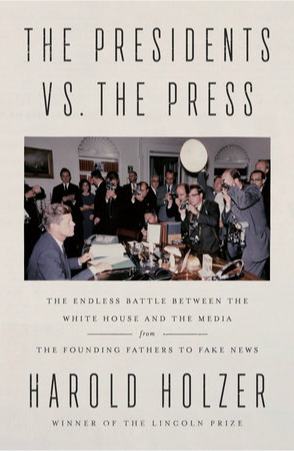Never Smooth Sailing: Presidents and the Press
Penguin/August 2020
By Harold Holzer
Reviewed by James Baxter
October 22, 2020
Donald Trump has long had a love-hate relationship with the news media. But given how some U.S. presidents have viewed the ink-stained wretches who wander the West Wing, POTUS 45’s taunts of “fake news” and “enemy of the people” are downright love letters.
Despite all the handwringing that Trump has wrought, particularly among liberals and progressives, author Harold Holzer finds Trump’s battles with the press, while rude, have not been as vicious as many. Indeed, Holzer, a scholar of Abraham Lincoln and the political culture of the Civil War period, makes a quite compelling case that America’s so-called greatest president was by far the worst when it came to upholding the values of a free press that were enshrined in the First Amendment. Holzer details how Lincoln abused the extraordinary powers granted him during the Civil War to seize newspapers and jail their editors in a bid to limit scrutiny and muzzle dissent.
It sure puts a Trumpian tweetstorm in perspective.
Working chronologically through the more than two centuries of U.S. history, Holzer focuses on 18 of the 45 presidents, each with his own chapter. What’s evident is the familiar pattern in which every president courts the media to get elected and then bristles under scrutiny. And as radio, television and now the internet have accelerated the pace at which news is gathered and disseminated, so too has it complicated the relationship between presidential administrations and the people who report their activities.
While Holzer gives special attention to Lincoln’s brutal approach to media relations, he doesn’t spare several others who, given their druthers, would have done much the same or worse. Indeed, John Adams probably did do worse, using the threat of the Alien and Sedition Acts to chill criticism of him and his Federalist Party.
More than 200 years later, Holzer details how Barack Obama, despite his telegenic appeal, was among the least friendly toward journalists. Obama knew that there was little he could do to control the news media, but he could starve them of information. He rarely interacted with White House correspondents and his administration used the 1917 Espionage Act eight times to prosecute whistleblowers who leaked information to journalists, more than twice the number of prosecutions under all previous presidents combined. The chilling effects were palpable throughout Washington and they emboldened authoritarian regimes around the world to do the same or worse.
President-press relations have not been all bad. While adversarial by design, sometimes they were actually quite cordial, not to mention productive. Teddy Roosevelt was among the first American presidents to realize the value of keeping trusted journalists close and happy. He was the first to clear an area in the White House so that scribes assigned to covering him would have a place to work.
Holzer also shows the effects evolving news technologies had on different presidencies over the years. From the early days to offset printing, newsreels, radio, television and now the internet, if there is a common theme it is that the presidents who were early adopters of the latest innovations were most successful at controlling how their messages were received. Franklin Delano Roosevelt mastered radio, which allowed him to talk directly — unfiltered – to the people; John F. Kennedy invited TV cameras to film press conferences; Obama effectively used social media to do an end-run around the journalism establishment; and, with his early-morning tweets, Trump has used social media to set the day’s news agenda by reaching millions while the mainstream media he excoriates amplify them to tens of millions more who don’t subscribe to his twitter feed.
The Presidents vs. The Press is a fun book that’s an easy read. It is an excellent trip through American political history told from a unique perspective. But perhaps its most enduring value will come the next time a president looks down from the podium at a reporter and says “That’s a really awful question…” because readers will know to not be too shocked. It’s just the latest battle in what has been a long cold war on the White House grounds.
James Baxter was founding editor and publisher of iPolitics and a Nieman fellow. He is currently a special advisor to the Assembly of First Nations and is active in community theatre in Ottawa.

